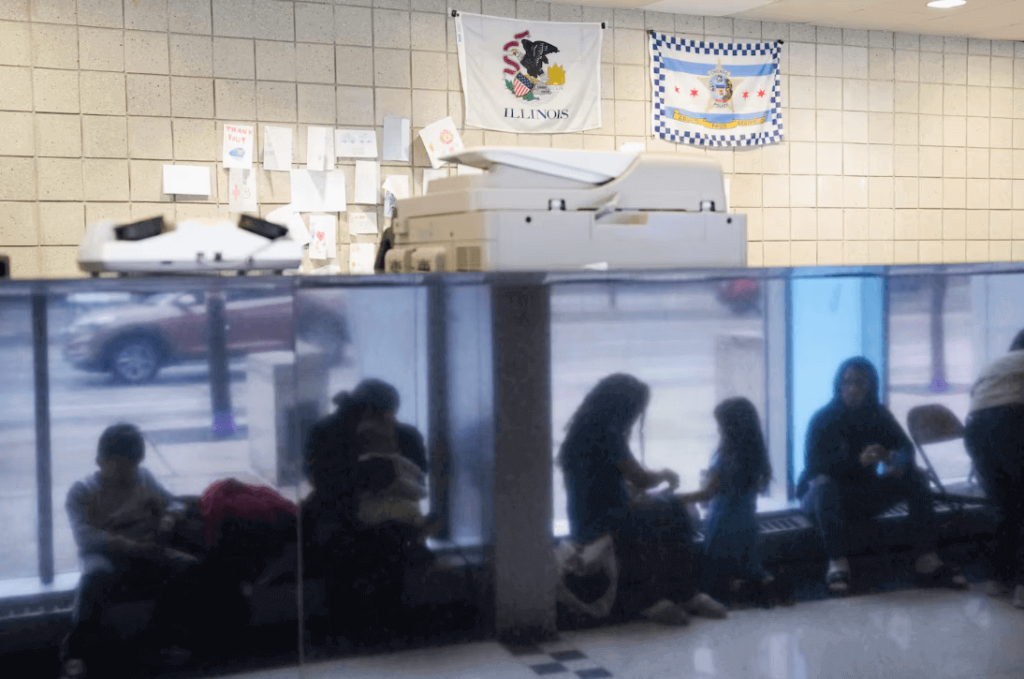【中美创新时报2025 年 2 月 7 日编译讯】(记者温友平编译)特朗普政府周四起诉芝加哥,指控该国第三大城市的“庇护”法律“阻碍”了联邦政府执行移民法的努力。美联社对此作了下述报道。
该诉讼还提到了伊利诺伊州,这是打击限制联邦移民局与当地警察合作的地方的最新举措。此前,联邦政府曾威胁对所谓的庇护城市提出刑事指控并削减资金。
根据芝加哥联邦法院提起的诉讼,芝加哥和伊利诺伊州官员多年来对联邦移民法的执行力度很小,而且经常是积极阻挠,导致无数罪犯被释放到芝加哥,而他们本应被拘留以驱逐出美国。”
针对庇护城市
唐纳德·特朗普总统经常单挑芝加哥和伊利诺伊州,因为这两个城市对移民的保护力度在全国名列前茅。上个月,高级政府官员访问了该市,启动了加强移民执法的计划,并展示了“边境沙皇”汤姆·霍曼逮捕移民的镜头。
这种咄咄逼人的做法和严厉的言辞受到了严厉批评,因为它们激起了移民社区的恐惧,并助长了关于移民犯罪的虚假指控。
虽然最近几个月,几起涉及非法入境者的高调暴力犯罪登上了新闻头条,但没有任何证据支持这种犯罪每天都在发生的指控。研究发现,非法居住在美国的人因暴力、毒品和财产犯罪被捕的可能性低于土生土长的美国人。
尽管如此,这种情绪是特朗普议程的基石。他签署的新政府的第一项法案以被杀害的佐治亚州护理专业学生莱肯·莱利的名字命名,要求拘留被指控盗窃和暴力犯罪的非法移民。
联邦资金削减
新任司法部长帕姆·邦迪周三宣誓就职数小时后,她下令停止司法部对“非法干涉联邦执法”的司法管辖区的拨款。
然而,法院一再维护一系列庇护法的合法性。这些法律不允许地方执法部门主动干涉联邦行动。第一届特朗普白宫还试图拒绝向庇护管辖区提供公共安全拨款,但法院也基本上驳回了这些尝试。
加州民主党总检察长罗布·邦塔表示,他正在监督该指令的实施。
他在一份声明中表示:“如果特朗普政府试图拖延或非法限制州和地方执法部门的重要公共安全资金,我们将毫不犹豫地做出回应。”
不过,特朗普政府已经明确表示,法律先例不一定会阻碍其行动。律师们表示,仅仅提起诉讼就可以威胁司法管辖区放弃庇护法。
移民倡导者预计,特朗普政府将使用一系列政治工具来对付庇护管辖区,从立法到邦迪的指令,再到威胁限制包括交通部在内的机构的资金。
支持移民政策的组织移民中心的联合执行董事克里·塔尔博特告诉记者:“这将是一场针对所有方面和多个机构的持续攻击。”
庇护城市誓言反击
针对芝加哥的诉讼声称,当地法律与联邦法律相悖,限制“地方政府与联邦执法官员分享移民信息”,并阻止移民局识别“可能被驱逐出境的个人”。
民主党占多数的芝加哥几十年来一直是庇护城市,并多次加强法律,包括特朗普 2017 年第一任期期间。同年,时任州长、共和党人布鲁斯·劳纳在法律中签署了更多全州庇护保护措施,这让他与党派产生了分歧。
芝加哥市长布兰登·约翰逊表示,芝加哥仍将是一个热情好客的城市。他和其他市长计划下个月在国会关于庇护城市的听证会上作证。近几个月来,芝加哥帮助举办培训,让人们了解他们在移民代理人方面的权利,并在公共交通站公布了这些信息。
“芝加哥居民的安全仍然是首要任务,”他在周四的一份声明中表示。“芝加哥将继续保护我们城市的劳动人民,并防止对我们长期价值观的攻击。”
伊利诺伊州民主党州长 JB Pritzker 表示,该州一直遵守法律。
“与唐纳德·特朗普不同,伊利诺伊州遵守法律,”普利兹克办公室在一份声明中表示。“特朗普政府没有与我们合作支持执法,而是让保护公众变得更加困难,就像特朗普赦免 1 月 6 日被定罪的暴力罪犯时所做的那样。”
诉讼中还提到了芝加哥所在的库克县及其警长。
库克县委员会主席托尼·普莱克温克尔在一份声明中表示,这个美国人口第二多的县“仍然致力于成为一个对所有居民都公平和热情的社区。”
警长汤姆·达特发表声明称,他的办公室不会通过或颁布移民立法,并遵守所有法律。
题图: 2023 年 5 月 1 日,委内瑞拉移民在芝加哥警察局第 16 区警察局避难时,大理石墙上倒映着他们的身影。(美联社照片/Charles Rex Arbogast,文件)Charles Rex Arbogast/美联社
附原英文报道:
Trump administration sues Chicago in latest crackdown on ‘sanctuary’ cities
By The Associated PressUpdated February 6, 2025
FILE – Immigrants from Venezuela are reflected in a marble wall while taking shelter at the Chicago Police Department’s 16th District station on May 1, 2023. (AP Photo/Charles Rex Arbogast, FIle)Charles Rex Arbogast/Associated Press
CHICAGO (AP) — The Trump administration sued Chicago on Thursday alleging that ‘sanctuary’ laws in the nation’s third-largest city “thwart” federal efforts to enforce immigration laws.
The lawsuit, which also names the state of Illinois, is the latest effort to crack down on places that limit cooperation between federal immigration agents and local police. It follows the federal government’s threats of criminal charges and funding cuts to what are known as sanctuary cities.
“The conduct of officials in Chicago and Illinois minimally enforcing — and oftentimes affirmatively thwarting — federal immigration laws over a period of years has resulted in countless criminals being released into Chicago who should have been held for immigration removal from the United States,” according to the lawsuit filed in Chicago’s federal court.
Targeting sanctuary cities
President Donald Trump has often singled out Chicago and Illinois because they have some of the nation’s strongest protections for immigrants. Top administration officials last month visited the city to launch stepped up immigration enforcement and showcased footage of “border czar” Tom Homan making arrests.
The aggressive approach and harsh rhetoric have been heavily criticized for stoking fears in immigrant communities and feeding false claims about crime among immigrants.
While several high-profile and violent crimes involving people in the U.S. illegally have been in the news in recent months, there is nothing to support the allegation that it happens daily. Studies have found that people living in the U.S. illegally are less likely than native-born Americans to have been arrested for violent, drug and property crimes.
Still, the sentiment is the cornerstone of Trump’s agenda. The first bill he signed of his new administration, named after slain Georgia nursing student Laken Riley, requires the detention of immigrants in the country illegally who are accused of theft and violent crimes.
Federal funding cuts
Hours after new Attorney General Pam Bondi was sworn in Wednesday, she ordered an end to Department of Justice grants for jurisdictions that “unlawfully interfere with federal law enforcement.”
Courts, however, have repeatedly upheld the legality of the range of sanctuary laws. The laws do not allow local law enforcement to actively interfere with federal operations. The first Trump White House also tried to deny public safety grants to sanctuary jurisdictions, but courts also largely rejected those attempts.
California Democratic Attorney General Rob Bonta said he is monitoring the directive’s implementation.
“We won’t hesitate to respond if the Trump administration attempts to delay or unlawfully condition vital public safety funding for state and local law enforcement,” he said in a statement.
The administration, though, has already made clear that legal precedent won’t necessarily stand in its way. Lawyers say that simply filing lawsuits can intimidate jurisdictions to back away from their sanctuary laws.
Immigration advocates expect the administration to use a range of political tools against sanctuary jurisdictions, from legislation to Bondi’s directives to threats to restrict funding from agencies including the Department of Transportation.
“This is going to be an ongoing attack on all fronts and in multiple agencies,” Kerri Talbot, the co-executive director of the Immigration Hub, a pro-immigration policy group, told reporters.
Sanctuary cities vow to fight back
The lawsuit against Chicago claims that local laws run counter to federal laws by restricting “local governments from sharing immigration information with federal law enforcement officials” and preventing immigration agents from identifying “individuals who may be subject to removal.”
Heavily Democratic Chicago has been a sanctuary city for decades and has beefed up its laws several times, including during Trump’s first term in 2017. That same year, then-Gov. Bruce Rauner, a Republican, signed more statewide sanctuary protections in law, putting him at odds with his party.
Chicago Mayor Brandon Johnson said Chicago will remain a welcoming city. He and other mayors plan to testify next month at a congressional hearing on sanctuary cities. In recent months, Chicago has helped host trainings for people to learn their rights when it comes to immigration agents and publicized the information at public transit stations.
“The safety and security of Chicago residents remains the priority,” he said in a statement Thursday. “Chicago will continue to protect the working people of our city and defend against attacks on our longstanding values.”
Illinois Democratic Gov. JB Pritzker said the state has always complied with the law.
“Unlike Donald Trump, Illinois follows the law,” Pritzker’s office said in a statement. “Instead of working with us to support law enforcement, the Trump Administration is making it more difficult to protect the public, just like they did when Trump pardoned the convicted January 6 violent criminals.”
The lawsuit also names Cook County, where Chicago is located, and its sheriff.
Cook County Board President Toni Preckwinkle said in a statement that the nation’s second-most populous county, “remained committed to being a fair and welcoming community for all residents.”
Sheriff Tom Dart issued a statement saying his office doesn’t pass or enact immigration legislation and follows all laws.
